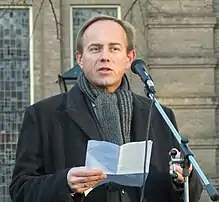Nashville Statement
The Nashville Statement is an evangelical Christian statement of faith relating to human sexuality and gender roles authored by the Council on Biblical Manhood and Womanhood (CBMW) in Nashville, Tennessee.[1][2][3] The Statement expresses support for marriage between one man and one woman, for faithfulness within marriage, for chastity outside marriage, and for a link between biological sex and "self-conception as male and female".[4] The Statement sets forth the signatories' opposition to LGBT sexuality, same-sex marriage,[1] polygamy, polyamory, adultery, and fornication.[4] It was criticized by egalitarian Christians and LGBT activists,[3][5] and several conservative religious figures.[1]
History
The Statement was drafted in late August 2017, during the annual conference of the Ethics and Religious Liberty Commission of the Southern Baptist Convention, at the Gaylord Opryland Resort & Convention Center in Nashville, Tennessee.[6] The statement was published online on August 29, 2017.[7] It was signed by more than 150 evangelical Christian leaders.[8]
Contents
The Statement includes a preamble and 14 articles.[7] The opening paragraph begins, "Evangelical Christians at the dawn of the twenty-first century find themselves living in a period of historic transition. As Western culture has become increasingly post-Christian, it has embarked upon a massive revision of what it means to be a human being."[9] The Statement presents a complementarian view of gender and a traditionalist view of sexuality.[1][8]
The Nashville Statement:
- Affirms that God designed marriage as a lifelong union between male and female, and that marriage "is meant to signify the covenant love between Christ and his bride the church";
- Denies that differences between men and women render the sexes "unequal in dignity or worth";
- Denies "that adopting a homosexual or transgender self-conception is consistent with God's holy purposes in creation and redemption."(art. VII b)
- Denies "that the approval of homosexual immorality or transgenderism is a matter of moral indifference about which otherwise faithful Christians should agree to disagree."(art. Xb)
- Affirms that "Christ Jesus has come into the world to save sinners and that through Christ’s death and resurrection forgiveness of sins and eternal life are available to every person who repents of sin and trusts in Christ alone as Savior, Lord, and supreme treasure".[4]
Notable signatories
In alphabetical order:
- Rosaria Butterfield, English professor and former LGBT activist[10]
- Francis Chan, preacher and author[11]
- William Lane Craig, philosopher and Christian apologist[12]
- James Dobson, psychologist, founder of Focus on the Family[13]
- Ligon Duncan, Presbyterian theologian, chancellor of the Reformed Theological Seminary[14]
- Erick Erickson, radio host at WSB in Atlanta[15]
- Ronnie Floyd, senior pastor of Cross Church, Arkansas, former president of the Southern Baptist Convention[13]
- John Frame, Presbyterian theologian[14]
- David French, attorney, former National Review contributor[6]
- Steve Gaines, former president of the Southern Baptist Convention[13]
- Jack Graham, pastor of Prestonwood Baptist Church, Plano, Texas[13]
- Kees van der Staaij, Leader of the Reformed Political Party
- Ken Ham, young-earth creationist and founder, CEO, and president of Answers in Genesis
- Jeff Iorg, Southern Baptist pastor, president of Gateway Seminary[14]
- Richard Land, president of Southern Evangelical Seminary[13]
- John F. MacArthur Jr., president of The Master's Seminary & College [14]
- Albert Mohler, president of the Southern Baptist Theological Seminary[14]
- J. P. Moreland, philosopher, theologian, and Christian apologist[14]
- Russell D. Moore, theologian and preacher, president of the Ethics & Religious Liberty Commission of the Southern Baptist Convention[13]
- J. I. Packer, evangelical Anglican theologian, professor of theology, Regent College[14]
- Paige Patterson, president of the Southwestern Baptist Theological Seminary[14]
- Tony Perkins, president of the Family Research Council[13]
- John Piper, Reformed Baptist theologian[14]
- Vaughan Roberts, Rector of St Ebbe's Church, Oxford, and Director of the Proclamation Trust[14]
- James Robison, televangelist[13]
- Thomas R. Schreiner, New Testament scholar[14]
- R. C. Sproul, Presbyterian theologian, founder and chairman, Ligonier Ministries[14]
- Donald W. Sweeting, president of Colorado Christian University[14]
Criticism and responses
Due to perceived homophobia, transphobia, and misogyny, the Nashville Statement has attracted significant controversy.[2]
- An opposing statement was published on August 30, 2017, by Christians United, a group of signatories. Brandan Robertson drafted the Christians United statement, and the Rev. Steve Chalke and others edited it. Signatories included John C. Dorhauer, the General Minister and President of the United Church of Christ; Yvette Flunder; and Jayne Ozanne.[16][17][18]
- Nashville mayor Megan Barry wrote "[the] so-called 'Nashville statement' is poorly named and does not represent the inclusive values of the city & people of Nashville".[19]
- The Episcopal Bishop of Central Florida, Gregory Brewer, described the statement as "tone deaf to the nuances of Jesus".[3]
- Jesuit priest James Martin replied to the Nashville Statement with his own set of affirmations and denials, beginning with "I affirm: That God loves all LGBT people".[20]
- Professor Jamin Andreas Hübner published the first full-length academic review of the Nashville Statement in Priscilla Papers (Winter 2019).[21]
The Statement has also received opposition from some same-sex marriage opponents. Catholic intellectual Ryan T. Anderson "[feared] that 'evangelical leaders either don't know what the word chastity means or don't defend its requirements in marriage.'"[22] Some evangelicals were sympathetic to the statement's theology, but critical of what they saw as its pastoral insensitivity.[23][1]
In June 2019, the General Assembly of the Presbyterian Church in America voted, 803 to 541, to endorse the Nashville Statement.[24]
Dutch version


On January 4, 2019, a Dutch version of the Nashville Statement was published; its publication subsequently drew much controversy. It was signed by 200 leaders from the Netherlands' orthodox-Protestant communities (including Member of Parliament and Reformed Political Party leader Kees van der Staaij). Its structure and content were very similar to the original statement, but a 'pastoral chapter' had been added, stressing that LGBT individuals were entitled to pastoral care, and recognizing that in the past religious communities had failed to show sufficient compassion towards them.[25]
The Dutch statement received some support in orthodox Protestant circles (although even there too, objections were raised), but was widely criticized by most religious leaders, politicians and human rights organizations. It was also widely discussed in the Dutch media.[26] The Public Prosecution Service indicated it would evaluate whether the publication was punishable under criminal law,[27] and they concluded it was not punishable, in part due to its relevance to public debate.[28] In the days following the publication, numerous town halls, churches and universities throughout the Netherlands flew the rainbow flag in a show of solidarity with the LGBT community.[29]
See also
References
- Beaty, Katelyn (31 August 2017). "Why even conservative evangelicals are unhappy with the anti-LGBT Nashville Statement". The Washington Post. Archived from the original on 2 September 2017. Retrieved 2 September 2017.
- Cruz, Eliel (1 September 2017). "The Nashville Statement Is an Attack on L.G.B.T. Christians". New York Times. Archived from the original on 2 September 2017. Retrieved 2 September 2017.
- Williams, Hattie (1 September 2017). "Nashville statement on sexuality prompts response from LGBT-supporting Christians". Church Times. Archived from the original on 2 September 2017. Retrieved 2 September 2017.
- "Nashville Statement". CBMW. Archived from the original on 2018-02-24. Retrieved 2018-02-26.
- "Evangelicals and the Nashville Statement: What is the point?". Christian Today. 31 August 2017. Archived from the original on 1 September 2017. Retrieved 2 September 2017.
- Meyer, Holly (30 August 2017). "What is the Nashville Statement and why are people talking about it?". The Tennessean. Retrieved 3 September 2017.
- Showalter, Brandon (30 August 2017). "Broad Coalition of Evangelicals Releases 'Nashville Statement' on Human Sexuality, Identity". The Christian Post. Archived from the original on 2 September 2017. Retrieved 3 September 2017.
- Sopelsa, Brooke (31 August 2017). "'Nashville Statement': Evangelical Leaders Release Sexuality Manifesto". NBC News. Archived from the original on 2 September 2017. Retrieved 2 September 2017.
- Bucher, Chris (30 August 2017). "READ: The Nashville Statement on LGBTQ & Transgender Acceptance". Heavy.com. Archived from the original on 3 September 2017. Retrieved 3 September 2017.
- Kumar, Anugrah (September 2, 2017). "Former Lesbian Explains Why She Signed the Nashville Statement". Christian Post. Archived from the original on September 2, 2017. Retrieved September 3, 2017.
- Anderson, Rod (2 September 2017). "What Is the Nashville Statement?". The Christian Post. Archived from the original on 2 September 2017. Retrieved 2 September 2017.
- "The Nashville Statement" (Podcast). September 22, 2017. Archived from the original on September 25, 2017. Retrieved September 23, 2017.
- Meyer, Holly (30 August 2017). "What is the Nashville Statement and why are people talking about it?". USA Today. Archived from the original on 31 August 2017. Retrieved 2 September 2017.
- "Initial Signatories". Nashville Statement. Council on Biblical Manhood and Womanhood. Archived from the original on 24 February 2018. Retrieved 2 September 2017.
- "Nashville Statement," August 2017
- Toumayan, Michael (31 August 2017). "Hundreds of Christian Leaders Denounce the Nashville Statement in an Open Letter". The Human Rights Campaign. Archived from the original on 1 September 2017. Retrieved 2 September 2017.
- "The Statement". Christians United. Archived from the original on 8 September 2017. Retrieved 2 September 2017.
- Blumberg, Antonia (30 August 2017). "Hundreds Of Christian Leaders Denounce Anti-LGBTQ 'Nashville Statement'". Huffington Post. Archived from the original on 1 September 2017. Retrieved 2 September 2017.
- Schmidt, Samantha (30 August 2017). "Evangelicals' 'Nashville Statement' denouncing same-sex marriage is rebuked by city's mayor". The Washington Post. Archived from the original on 2 September 2017. Retrieved 2 September 2017.
- Martin, James (30 August 2017). "Seven simple ways to respond to the Nashville Statement on sexuality". The Washington Post. Archived from the original on 1 September 2017. Retrieved 2 September 2017.
- Hubner, Jamin (January 2019). "A Critical Review of the Nashville Statement". Priscilla Papers. Christians for Biblical Equality.
- "Nashville and Sodom - Aaron Taylor". 11 September 2017. Archived from the original on 2018-02-14. Retrieved 2018-02-13.
- Williams, Hattie (8 September 2017). "To sign or not: Nashville Statement on sexuality debate intensifies". Church Times. Archived from the original on 24 November 2018. Retrieved 15 January 2018.
- Gryboski, Michael (28 June 2019). "PCA endorses Nashville Statement on biblical sexuality". The Christian Post. Archived from the original on 28 June 2019. Retrieved 29 June 2019.
- "Nashvilleverklaring krijgt pastoraal nawoord (Nashville Statement gets pastoral postscript)". RD - reformatorisch Dagblad. 2019-01-04. Archived from the original on 2019-01-04. Retrieved 2019-01-05.
- De Fijter, Nico (2019-01-05). "Grote groep orthodox-protestantse predikanten spreekt zich met 'Nashville-verklaring' stevig uit tegen homoseksualiteit (Large group of orthodox-protestant ministers speak out against homosexuality in 'Nashville-Statement')". www.trouw.nl. Archived from the original on 2019-01-06. Retrieved 2019-01-06.
- "OM onderzoekt mogelijke strafbaarheid van Nashville-verklaring". NOS (in Dutch). 7 January 2019. Archived from the original on 7 January 2019. Retrieved 7 January 2019.
- "Nashvilleverklaring naar oordeel OM niet strafbaar". Openbaar Ministerie. 12 March 2020.
- "Op veel plekken wapperen regenboogvlaggen om Nashville-verklaring (Rainbow flags flying in many places because of Nashvillestatement)". nos.nl (in Dutch). 8 January 2019. Archived from the original on 2019-01-08. Retrieved 2019-01-08.